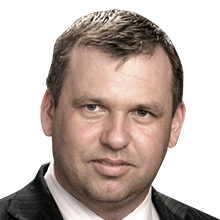One of the widely discussed topics in mass media has become a report on a lawsuit lodged against the Russian Federation with the European Court of Human Rights (ECHR) by the families of victims of the Malaysian Airlines flight MH17, which had been shot down in the skies over Donbas in the summer of 2014. The suit was filed by an Australian law firm LHD Lawyers representing the claimants from Australia, New Zealand and Malaysia.
There are various ideas regarding this case’s jurisdiction. Some say the matter should be resolved in the International Criminal Court in The Hague, some believe that the issue falls under the national jurisdiction of the United States, the Netherlands, or the International Court of Justice ... However, in my opinion, it is the European Court of Human Rights in Strasbourg which may be the most effective forum for resolving the dispute over recovering damages caused to the families of victims of the disaster.
According to a report published by the Dutch Safety Board, the cause of the accident was the destruction of the aircraft with a Buk surface-to-air missile launched from the territory controlled by pro-Russian separatists. The question of control over the territory where the launch site was located is crucial in this case as it is closely tied with the question of jurisdiction and responsibility.
Chicago Convention stipulates that each contracting state is responsible for everything happening in its airspace. Similarly, Article 1 of the Convention on Human Rights and Fundamental Freedoms stipulates that each State Party shall secure to everyone within their jurisdiction the rights and freedoms defined in the Convention. However, the ECHR in the application of the European Convention uses a flexible approach to determining jurisdiction over the territory by introducing the concept of "effective control over territory."
It is the European Court of Human Rights in Strasbourg which may be the most effective forum for resolving the dispute over recovering damages caused to the families of victims of the disaster
In other words, not every state will be responsible for the actions committed on its territory if that territory is occupied or even controlled by separatist groups supported by a third state. In such circumstances, it is the invader-state which will bear full responsibility for the actions that take place in the designated area.
The concept of effective control over the territory has been developed in cases related to the events that took place in Transnistria, Nagorno-Karabakh and the Turkish Republic of Northern Cyprus. That is, the cases involving the areas occupied by a foreign state or separatist groups supported by that state.
Incidentally, the Russian Federation has already been a defendant in such cases, and its role in supporting separatist groups has already been studied by court. For example, in the cases of Chirahov vs Armenia and Ilyasku and others vs Moldova and Russia, the ECHR has developed the concept of the "effective control over territory" formula. Each member of the European Convention is responsible for violations of human rights and freedoms committed on territory under its jurisdiction. It is exercising jurisdiction over the territory is key in determining the issue of laying responsibility on the state.
In terms of public international law, the phrase "within their jurisdiction" specified in Article 1 of the Convention means the jurisdiction of the state is not only directly territorial, but it can also be exercised through the state territory. However, this presumption may be restricted in exceptional cases, such as when the state is limited from, kept out of or lost control over part of its territory. For example, as a result of military occupation, armed conflict and, importantly, due to the actions of a foreign country that supports or incites separatist movements in the territory of other states where human rights violations took place.
Each member of the European Convention is responsible for violations of human rights and freedoms committed on territory under its jurisdiction
In this case, regardless of the legality or illegality of actions of a foreign state, its motives or justification, the responsibility will be laid exactly on the state which incites or supports separatism. In this case, a jurisdiction of the occupier-state can be exercised not only via its public authorities but also through the separatist groups which it supports. The term "support" has a fairly broad interpretation and includes political, economic and military components.
Therefore, given the volume of factual evidence, the prospects of the suit filed in the interests of the families of MH17 victims look promising.
Arseniy Herasymiv is a lawyer at Ilyashev & Partners law firm


